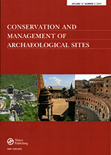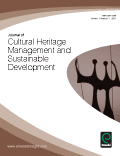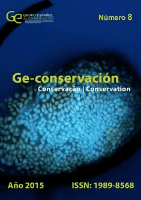
Conservation Science in Cultural Heritage
Scope & Guideline
Transforming Conservation Practices Through Research
Introduction
Aims and Scopes
- Heritage Conservation Techniques:
Focuses on innovative methodologies for the conservation of various forms of cultural heritage, including architectural, archaeological, and artistic works. This includes non-destructive testing and digital modeling techniques. - Digital Documentation and Technology:
Explores the use of digital technologies, such as 3D scanning, photogrammetry, and AI, to document and preserve heritage sites and artifacts. This reflects a growing trend towards integrating technology in heritage management. - Cultural Heritage Management:
Investigates strategies for effective management of cultural heritage resources, including community involvement and sustainable tourism practices. This aims to balance preservation with public engagement. - Interdisciplinary Approaches:
Encourages collaboration across disciplines such as art history, archaeology, architecture, and environmental science to enrich the understanding and preservation of cultural heritage. - Cultural Identity and Heritage:
Examines the relationship between cultural heritage and identity, focusing on how heritage influences and reflects local and national identities.
Trending and Emerging
- Artificial Intelligence in Conservation:
The use of AI technologies in art and heritage preservation is gaining momentum, illustrating a trend towards employing advanced analytics and machine learning to enhance conservation efforts and improve documentation processes. - Digital Heritage and Virtual Reality:
There is a noticeable increase in research focusing on digital heritage, including virtual reality and digital twin technologies, which offer innovative ways to engage with and preserve cultural sites. - Sustainable Tourism Practices:
Emerging studies emphasize the importance of sustainable tourism as a means to protect cultural heritage while promoting local economies, reflecting a growing awareness of the need for responsible heritage management. - Community Engagement in Heritage Preservation:
Recent papers highlight the significance of involving local communities in the conservation process, indicating a shift towards participatory approaches that empower stakeholders in heritage management. - Cross-Cultural Studies and Global Perspectives:
The journal is increasingly featuring studies that explore cross-cultural influences and global perspectives on heritage, underscoring the interconnectedness of cultural narratives in a globalized world.
Declining or Waning
- Traditional Conservation Methods:
There seems to be a decreasing emphasis on conventional conservation practices, as newer technologies and methodologies gain traction in the field, indicating a shift towards more innovative and technology-driven approaches. - Historical Contextual Studies:
Research focusing solely on historical aspects without integration into contemporary conservation practices is becoming less frequent, suggesting a move towards studies that connect past practices with current challenges. - Local Cultural Practices:
While still relevant, the exploration of localized cultural practices in isolation appears to be waning, with a growing preference for studies that address broader themes of globalization and transnational influences on heritage. - Environmental Impact Studies:
There is a noticeable reduction in papers specifically addressing the environmental impacts on cultural heritage, as the focus shifts towards more direct conservation strategies and technological solutions.
Similar Journals

Virtual Archaeology Review
Advancing the Future of Archaeology through Virtual Innovation.Virtual Archaeology Review, published by UNIV POLITECNICA VALENCIA, EDITORIAL UPV, is a distinguished open-access journal dedicated to the dynamic fields of archaeology and conservation. Based in Spain, this journal has made a significant impact in the academic community, reflected in its outstanding Q1 ranking in Archeology and Conservation for 2023, alongside impressive standings in related disciplines such as Computer Science Applications. With an active commitment to promoting the accessibility of knowledge since 2010, it provides a platform for researchers, professionals, and students to share innovative findings and methodologies in virtual archaeology, fostering collaboration across disciplines. The journal's impact factor and its strategic focus on advancing the practice of virtual methodologies in archaeology underscore its vital role in bridging technology and heritage studies. By embracing a multidisciplinary approach, Virtual Archaeology Review not only enhances academic discourse but also drives the development of effective conservation strategies, making it an essential resource for those dedicated to the preservation and appreciation of our cultural heritage.

Archeologia e Calcolatori
Advancing Archaeological Science through Innovative MethodologiesArcheologia e Calcolatori is a distinguished open-access journal published by EDIZIONI ALL INSEGNA GIGLIO SAS in collaboration with the Italian National Research Council, dedicated to advancing knowledge in the fields of archaeology and its intersections with computational methodologies. Since its inception in 1998, the journal has become a pivotal resource for researchers and practitioners, offering a platform for innovative studies and critical discussions at the forefront of archaeological science. With its current impact reflected in Scopus rankings, Archeologia e Calcolatori is placed in Q2 for both Archaeology and Archaeology (Arts and Humanities), and its commitment to quality scholarship is evident. The journal benefits from open access, ensuring that scholarly findings are readily available to a global audience. By prioritizing the dissemination of interdisciplinary research methods and explorative analyses, it aims to foster collaboration and inspire new directions in archaeological and computational research.

DENKMALPFLEGE
Preserving the Past, Shaping the Future.DENKMALPFLEGE is a prestigious journal published by DEUTSCHER KUNSTVERLAG GMBH, focusing on the field of cultural heritage conservation and restoration. With its ISSN 0947-031X and E-ISSN 2569-1589, this publication serves as an essential resource for researchers, professionals, and students dedicated to the preservation of historical monuments and sites. Although the journal does not currently offer open access, it provides a valuable wealth of scholarly articles, case studies, and reviews that critically engage with contemporary debates in conservation practices. Published in Munich, Germany, it bridges academic research with practical applications, underlining its importance in enhancing the discourse surrounding heritage preservation. Alongside its historical coverage from 2009 to 2012, DENKMALPFLEGE continues to be a vital platform for advancing knowledge in the field, promoting best practices, and fostering collaboration among experts.

Conservar Patrimonio
Championing the Art and Science of Conservation.Conservar Patrimonio is a leading academic journal dedicated to the fields of conservation and museology, published by the ASSOC PROFISSIONAL CONSERVADORES-RESTAURADORES PORTUGAL. Established as an open access platform since 2005, it aims to disseminate high-quality research and innovations essential for the preservation of cultural heritage. With an impressive 2023 impact factor, Conservar Patrimonio holds a Q2 ranking in Conservation and a Q1 ranking in Museology, reflecting its significant contribution to both disciplines. The journal is indexed amongst the top 30% of publications in the Museology category and offers valuable insights into the methodologies and practices that shape the conservation of cultural artifacts. Researchers, professionals, and students are encouraged to engage with the latest findings, case studies, and theoretical explorations presented in this esteemed journal based in Portugal, enhancing the global dialogue on conservation practices.

Conservation and Management of Archaeological Sites
Preserving the Past, Shaping the Future.Conservation and Management of Archaeological Sites is a pivotal academic journal published by Routledge Journals, Taylor & Francis Ltd, focusing on the interdisciplinary fields of archaeology and conservation. With an ISSN of 1350-5033 and an E-ISSN of 1753-5522, this journal strives to publish high-quality research that addresses critical topics related to the conservation and management of archaeological sites, fostering dialogue between practitioners, researchers, and policymakers. Despite being categorized in the third quartile (Q3) across multiple relevant categories such as Archaeology and Conservation in the 2023 rankings, it remains a significant resource for professionals seeking to enhance their understanding and application of best practices in site management. The journal plays a crucial role in disseminating knowledge that contributes to the preservation of cultural heritage, making it an essential read for anyone involved in these vital fields. Published since 1995, the journal not only reflects the growing importance of archaeology in today's society but also provides a platform for emerging research that will shape future conservation strategies.

Intervencion-Revista Internacional de Conservacion Restauracion y Museologia
Advancing Knowledge in Heritage Conservation.Intervencion-Revista Internacional de Conservacion Restauracion y Museologia is a prominent journal published by the Nacional Instituto de Antropología e Historia (INAH), focusing on the critical fields of conservation, restoration, and museology. With an ISSN of 2007-249X and E-ISSN 2448-5934, this journal serves as a vital platform for researchers, professionals, and students dedicated to the preservation of cultural heritage. Situated in Mexico, the journal aims to foster international collaboration and knowledge sharing in conservation practices and theoretical frameworks, supported by in-depth research and case studies. While the journal adopts a closed access model, its reputation continues to thrive, attracting contributions from respected scholars and practitioners globally. By integrating diverse perspectives on conservation strategies and museum studies, Intervencion significantly impacts the advancement of interdisciplinary methodologies in the heritage sector, making it an essential resource for anyone committed to the protection of cultural legacies.

Journal of Cultural Heritage Management and Sustainable Development
Championing research that preserves and promotes our past.Journal of Cultural Heritage Management and Sustainable Development is a pioneering publication dedicated to advancing the fields of cultural heritage management and sustainable practices. Published by Emerald Group Publishing Ltd in the United Kingdom, this journal has established itself as a critical resource since its inception in 2011, with an ongoing commitment to quality research through 2024. The journal is notably recognized with a Q1 ranking in Conservation and boasts impressive Scopus rankings, highlighting its significant impact in the realm of arts and humanities. It also showcases a multidisciplinary approach, bridging gaps between business management and urban studies, thereby providing invaluable insights to researchers, professionals, and students. With diverse access options to engage a broad audience, the Journal of Cultural Heritage Management and Sustainable Development thrives at the intersection of scholarship and practical application, making it an essential read for those dedicated to fostering sustainable development in cultural heritage contexts.

Mediterranean Archaeology & Archaeometry
Connecting Scholars Across Mediterranean NarrativesMediterranean Archaeology & Archaeometry is a premier academic journal dedicated to advancing the fields of archaeology, anthropology, conservation, and history, published by UK Zhende Publishing Ltd. With its ISSN 1108-9628 and E-ISSN 2241-8121, this journal serves as a vital platform for scholars and practitioners to disseminate innovative research and findings related to the rich archaeological heritage of the Mediterranean region. It has gained remarkable recognition, achieving a Q2 ranking in anthropology and archaeology, and a Q1 classification in several categories including arts and humanities, conservation, and history as of 2023. Its impressive Scopus rankings underscore its impact, with a significant position in history (59/1760) and conservation (11/103) disciplines. Spanning years from 2008 to 2022, the journal invites open access contributions to foster collaboration and interdisciplinary dialogue among researchers, students, and professionals alike, making it an indispensable resource for those engaged in the exploration and preservation of historical narratives within the Mediterranean context.

Ge-Conservacion
Elevating Scholarly Dialogue on Heritage and MuseologyGe-Conservacion, published by GRUPO ESPANOL I I C, stands as a pivotal journal in the fields of Conservation, Museology, and Visual Arts and Performing Arts, facilitating an open-access platform since 2009. Based in Spain, this journal serves as a vital repository for innovative research and scholarly dialogue, significantly impacting the community with its Q1 and Q2 rankings across several categories in 2023. With an objective to advance multidisciplinary understanding and practices related to cultural heritage conservation, it attracts a diverse readership of researchers, professionals, and students eager to engage with contemporary issues and methodologies. The journal's commitment to accessibility enhances its reach and influence, making it an essential resource for anyone passionate about preserving the integrity and significance of our artistic and historical treasures.

Culture et Musees
Advancing Insights in Museology and the ArtsCulture et Musées is a prominent journal published by ACTES SUD, dedicated to exploring the multifaceted domains of conservation, cultural studies, museology, and the visual and performing arts. With the ISSN 1766-2923 and E-ISSN 2111-4528, this scholarly platform serves as an essential resource for researchers, professionals, and students interested in the dynamic interplay between cultural heritage and contemporary practices. Although the journal does not offer Open Access, it maintains a notable presence in academic circles, evidenced by its rankings in Scopus. In 2023, it ranked in the fourth quartile across various categories, including Conservation and Cultural Studies, reflecting its commitment to enhancing discourse in these fields. By publishing rigorous research, theoretical contributions, and case studies, Culture et Musées aims to bridge academic insights with practical applications, fostering a deeper understanding of cultural institutions and their societal roles. Located in France, this journal is positioned to influence a global audience while enriching local scholarship.